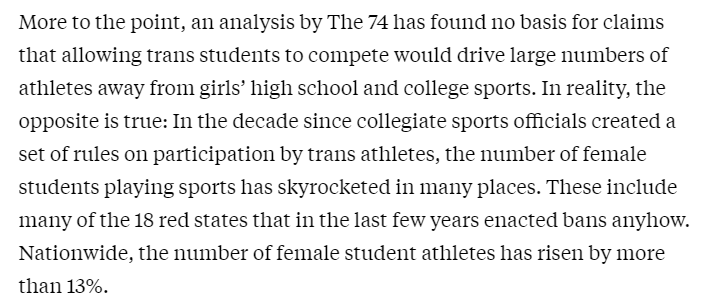Newsletter #4: New look, new format
A Dam Breaks?
Signs of a Shifting Media Landscape Post Stewart Interview
There has been an unmistakable feeling of a shift in the landscape in coverage of trans issues over the past two weeks.
I can’t put any real numbers on it. (At least not yet, though more to come, perhaps.) But, neither can I deny that the experience of sifting through headlines about trans issues has undergone a profound and sudden change, from where things were when I first started to where they seem to be right now.
At the beginning of this project, three weeks ago, my news searches were dominated by anti-trans headlines in all manner of right, far right, and extreme right outlets. From Christian media to Sinclair-owned TV stations, from conservativep-leaning local papers to more well known right wing news outlets such as FOX, the Daily Caller, and deep into hate sites and obscure blogs. This was almost all of what I saw, day in, day out. But now, in this short time, that balance seems to have shifted. I’m noticing I have to pass by more and more good articles, to find the bad ones I spy on for Assigned.
Instead of dominating the coverage, anti-trans propaganda seems to make up half the headlines that I read, sometimes a little less, sometimes a little more. Don’t get me wrong, the bad stuff is still really bad. But suddenly, seemingly out of nowhere, there’s a lot of good stuff, too.
One example of this good stuff is this piece on the 74 million, a (mainstream) nonprofit education news website, by Beth Hawkins. It makes the case that fears about transgender girls competing on girls’ sports teams are unsupported by the evidence, because the evidence shows that girls’ participation in sports is increaing, which means the small number of trans girls on the teams can’t have driven cis girls off of them.
Here, you can read for yourself. Here’s a screenshot I took:
Perhaps this could have run two weeks ago. But mainstream stories with a trans positive lean felt incredibly rare on the ground, and pieces in the LGBTQ+ press felt as though the were being all but drowned out by the flood of anti-trans propaganda from the right. Those mainstream pieces that did run often seemed so intent on giving the anti-trans side the benefit of the doubt it was easy to imagine readers coming away less well-informed than if the piece had never been published at all.
It’s hard to imagine that this change I’m sensing has nothing to do with the viral interview by Jon Stewart, which I wrote about for Slate a week ago last Monday. I argued Stewart’s tough questioning of transphobic Arkansas Attorney General Leslie Rutledge, a lawmaker instrumental in the passage of a law to ban all gender affirming care for minors in the state, represented a moment where people who had been fence-sitting and both sidesing on trans issues on the left could get excited about standing up for truth and science against Republicans anti-trans pols who had no facts.
Of course, there are likely a variety of factors at play. The midterm elections for the house and senate will be upon us soon, and there is likely some dawning awareness in mainstream outlets just how central to the GOP case anti-trans talking points have become. When you look closely at those points, they really tend to fall apart. And so, perhaps, a sense that there ought to be more pushback has begun to dawn, and Stewart, the improving mainstream coverage, and my own projet are all coming from that same sense. Still, the Stewart interview moment really felt like the breaking of a dam, and this new rush of accurate mainstream stories about trans issues has been both refreshing and lovely for me to see.
ICYMI
A discussion of detransition anecdotes, and why the right is not giving even half the story to readers when they write stories based on them
An interview with a fellow journalist, Adam Zivo, with whom I very much did not agree
Updates to our Timeline coverage of the Randolph, VT Girls Volleyball Team, a story which is still going, even as much of the right wing media has moved on to the next salacious story they can misrepresent
Next Week
Hello, it’s your friendly neighborhood Evan Urquhart here, just thinking off the dome, don’t hold me to any of this, please. I thought I might try to put some numbers on the shifting balance of coverage I described more subjectively in the newsletter today. I haven’t done much (ok, ok, or any) data journalism before, but I’ve had one or two little ideas there. We’ll see.
I've also been thinking about school boards, and how to bring a sense of how much energy on the right’s been going into placing transphobes on to local school boards, likely with a longer piece.
Last but not least, if nothing more urgent arises, next week’s newsletter may feature a bit more about how having been a foster parent for trans youth was so crucial to my understanding of trans issues and the urgency of my desire to do my part to help protect trans youth.
Thank you again for reading, and I’ll see you here next week.


